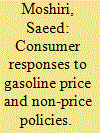|
|
|
Sort Order |
|
|
|
Items / Page
|
|
|
|
|
|
|
| Srl | Item |
| 1 |
ID:
171369


|
|
|
|
|
| Summary/Abstract |
Gasoline consumption in emerging economies have been rising rapidly due to economic growth and increasing urbanization rate in recent years. However, the development has brought about new socio-economic and environmental challenges leading governments to adopt various policies to control the trend. Although the impacts of price changes on gasoline consumption are well-researched in the literature, studies on different policies in a specific country is limited. In this paper, we investigate the impact of three distinct policies (price reform, rationing, and fuel-efficiency) on consumer responses in Iran. We estimate price, income, and efficiency elasticities across household characteristics, income groups, and provinces using the AIDS model and the household expenditures data for the period 2005–2016. The results show that the average price elasticity is -76, however, it varies across household characteristics, time, and space. The price responses are greater in provinces neighbouring the countries with high price differentials and welfare losses of price reform are more sever for lower income families. The estimated elasticities under different policy regimes show that energy price reform has led to significantly higher elasticities, while rationing has led to decreased elasticities. The more stringent efficiency regulation and increasing imports of fuel-efficient cars have also increased elasticities.
|
|
|
|
|
|
|
|
|
|
|
|
|
|
|
|
| 2 |
ID:
186005


|
|
|
|
|
| Summary/Abstract |
This article examines governments' responses to food crises and famines in the nondemocratic world. After the sudden collapse of the Soviet Union, many of the remaining communist countries encountered an unprecedented level of food shortage and economic hardship, which, in turn, expedited or led to regime collapse. However, Cuba and North Korea are striking cases that have managed to survive the extreme situations from the 1990s onward. In this comparative-historical research, I argue that although the two countries implemented different coping strategies in light of domestic food distribution and international aid inducement, similar outcomes are observed in terms of regime survival. Despite the varied strategies, the state-mandated food politics were commonly mobilized through public rationing in these countries during the Cold War. This pre-crisis statecraft effectively disempowered the people, leaving them with a strong dependency on the state food systems and a weak voice of complaint against their governments.
|
|
|
|
|
|
|
|
|
|
|
|
|
|
|
|
|
|
|
|
|